UPDATE: Nikolai won silver in the Nordic Championship for sommeliers in Helsinki on 8th October. The competition ran over two days and had 10 participants in total, where the Speilsalen Head Sommelier eventually came in 2nd, just behind eventual winner Danish Jonathan Goveia. Swedish contestant Emma Ziemann came in 3rd place.
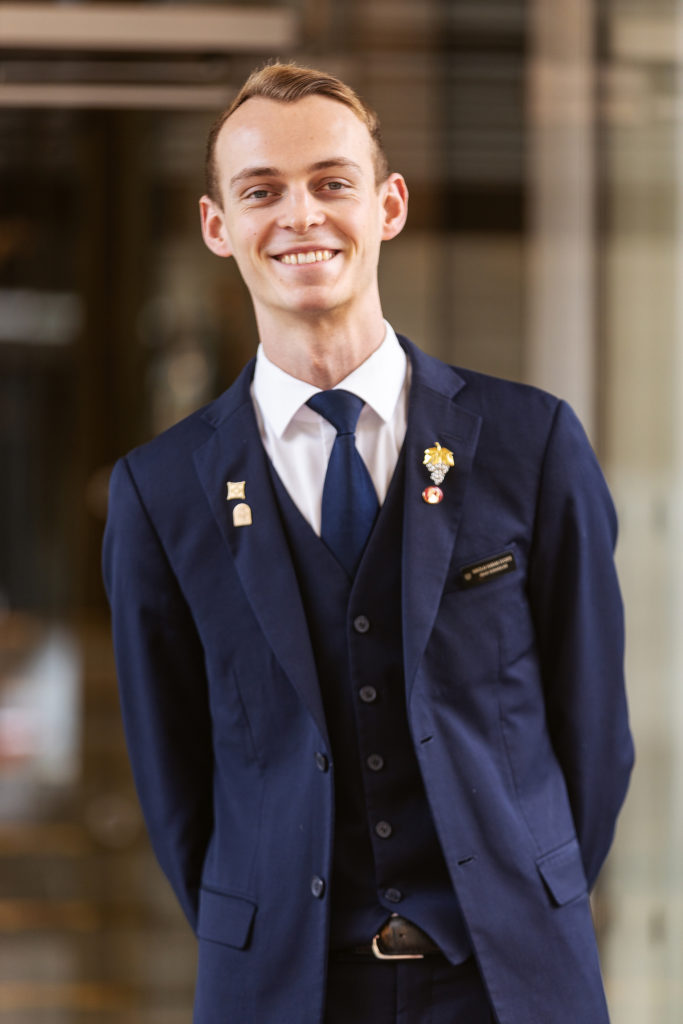
Throughout its 153-year history, Britannia Hotel has had a proud tradition of supporting the career paths of tomorrow’s culinary stars.
Since reopening in 2019, the hotel has strived to maintain (and enhance) its reputation as a workplace where hospitality professionals can reach their full potential. Not only does Britannia hire and train dozens of apprentices every year, but it also puts several forward for a wide range of competitions, both locally and internationally.
At the end of last week – a week in which we celebrated Speilsalen’s Håvard Werkland and his success in Årets Kokk – The Collector had the pleasure to sit down with the restaurant’s Head Sommelier, Nikolai Haram, ahead of his participation in the Nordic Sommelier Championships.

The Collector: It’s been a glorious week for Speilsalen and the hotel, following a whirlwind of a year in the restaurant. With a new Head Chef, Håkon Solbakk, and many of your team competing in national competitions, you must be looking forward to the relative calm of the autumn season?
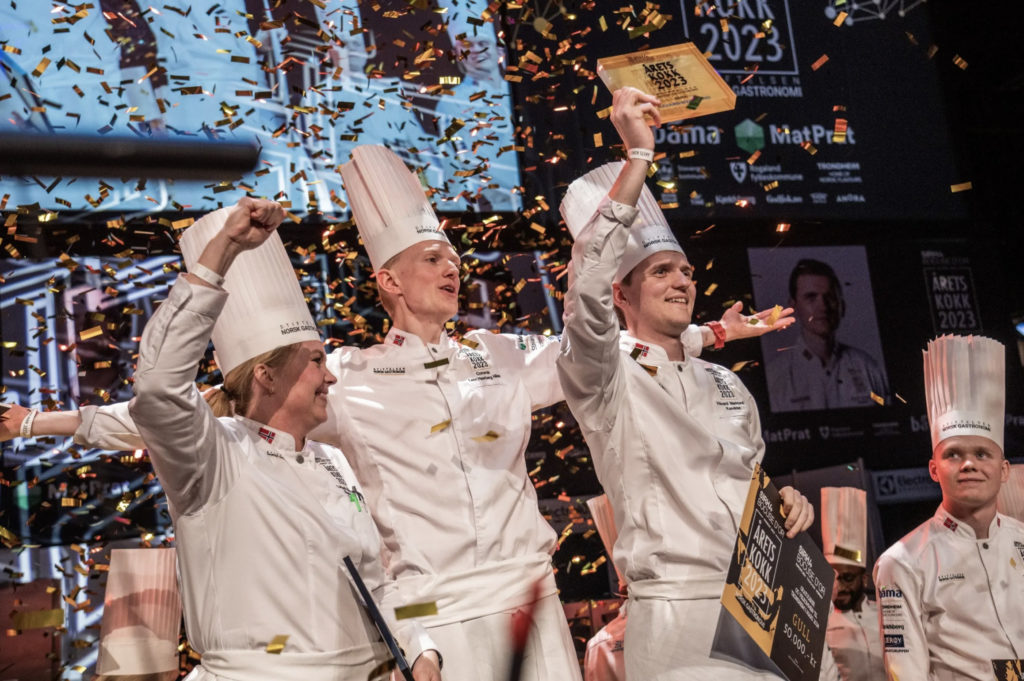
Chef of the Year 2023
Håvard WerklandNikolai: “We are really looking forward to having Håkon back in the kitchen. He has some changes he wants make and we are all excited to see what they are. Håkon has developed loads of interesting tastes and techniques over the past six months, in the process of developing his menu for Årets Kokk. It will be fascinating to see how these are integrated into our menus going forward.”
TC: Speilsalen had two chefs competing in the Årets Kokk competition this year, and interim Head Chef Henrik Falkensten also competed in (and won) the Pastry Chef of the Year 2023. You won the Norwegian Sommelier competition earlier in the year and next month you are off to Finland to represent Norway in the Nordic awards. It must be incredibly exciting and challenging in equal measure?
N: “Through all the changes we have had this year, we have kept the standard up in Speilsalen the whole time and in fact the service has never been as good as it is now. The service team, which I am part of, has been very stable.”
“The great thing is that as Head Sommelier I have an opportunity to elevate and change the experience for all our guests, even if they are return visitors who have been recently. The wine pairing changes regularly, sometimes out of necessity because I like to work with small boutique wineries, with small productions, but also because we are continously tweaking and perfecting the combinations. If we have guests coming frequently, I will remember what they had last time and I might change the wine pairing to match their interests or to give them something different from before. I may even make tweaks especially for you!”
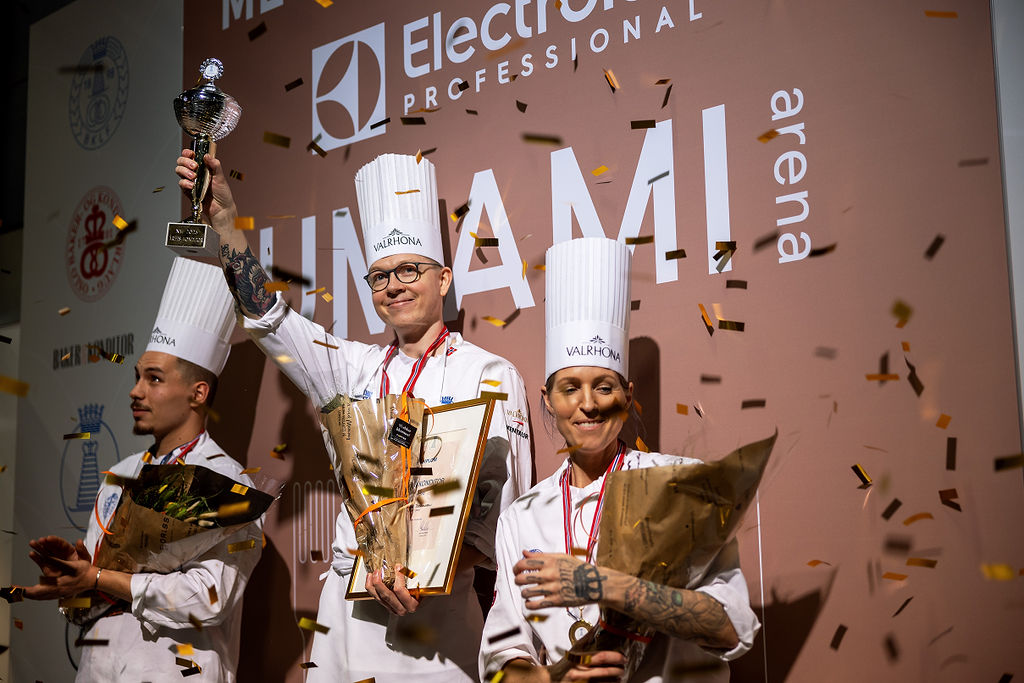
Norway Pastry Chef of the Year 2023
Henrik FalkenstenTC: Thank you! The wine pairing has always been of an incredibly high standard at Speilsalen. I had the pleasure to experience your Champagne Lunch recently; the Saturday serving where you match four of the main menu’s highlights with four different small producers of Champagne. It was an ingenious pairing, with each round focusing on a different grape. How closely do you work with the chefs when putting together these experiences and developing new menus?
N: “We are involved from the start in most cases. The chefs know that if the menu hits different notes it allows me to introduce different styles of wine during the dining experience.”
“For example, today I have dessert tasting for a dish which we have been working on together for weeks. This dish will sit alongside our other sweet dishes and so if you are going to have multiple desserts paired with multiple wines you don’t want to them to be too similar and suited to the same style of wine. So, I’ve been able to discuss what kind of wine styles we want to use and then that might influence the direction of each dessert. It’s really a collaborative effort, and I’m grateful to work with a kitchen that takes the wine pairing seriously.”
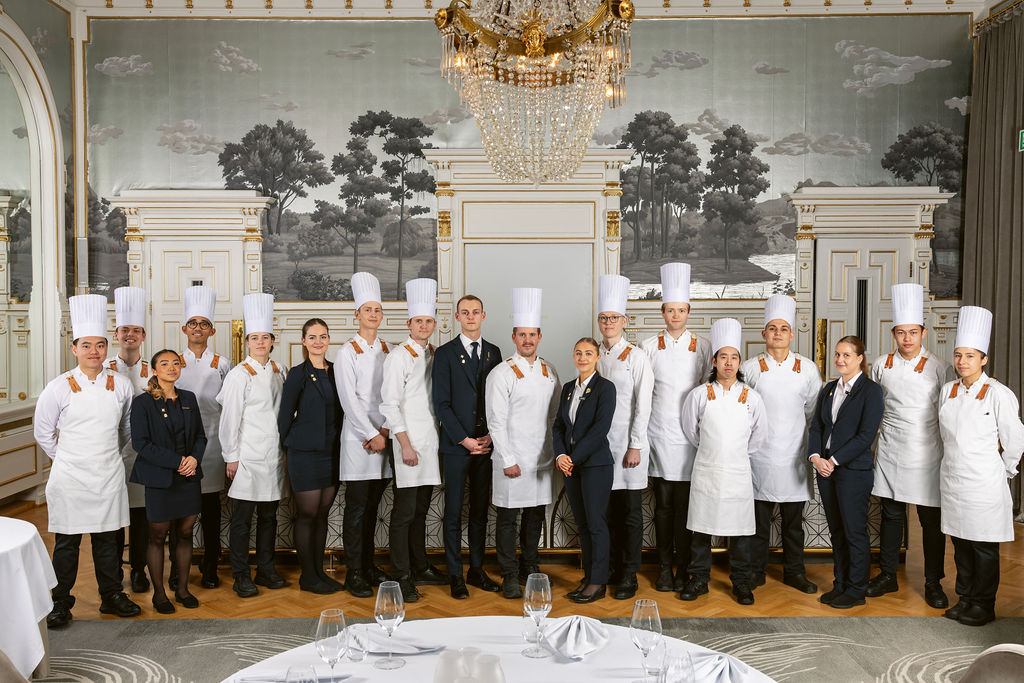
TC: It sounds like you have great new tastes incoming. How have you managed to also find time to train for the Sommelier Competition next month?
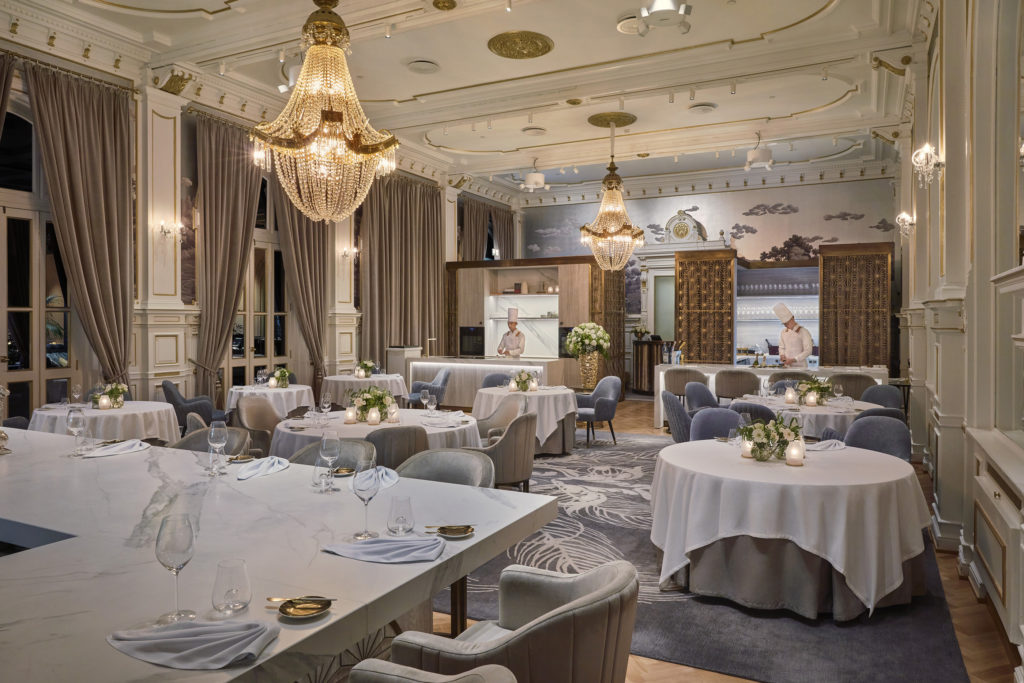
Speilsalen
read moreN: “I spend most of my free time working on theory, reading and memorising things. I do some blind tasting, assisted by my colleagues here at Britannia. Other sommeliers, who have knowledge of how the competition works will bring me interesting wines from their departments, give me a challenge and try and catch me off guard!”
TC: And when you are in training, what kind of things are you researching and revising for?
N: “With the blind tasting, I work on my tasting notes and how to describe the wines precisely. There’s kind of a grid you go through: you are first looking at the appearance of the wine and there is seven points you can get there. Is the wine clear or not? What type of colour is it? What is the depth of the colour? What is the appearance of the rim? Are there any sediments? Viscosity? Does the wine look young? Or is it old? … all this just on the appearance.”
“And then you have a similar set of notes for the nose and then for the palate, and then you have a conclusion for what you think the wine is, how it is made, the quality level, how you would serve it, what kind of temperature, what kind of glass, what kind of food would you serve it with. There are a lot of things to go through with each wine. I like to have that ‘grid’ imprinted in my mind so that I can go through it fast because you usually do not have a lot of time.”
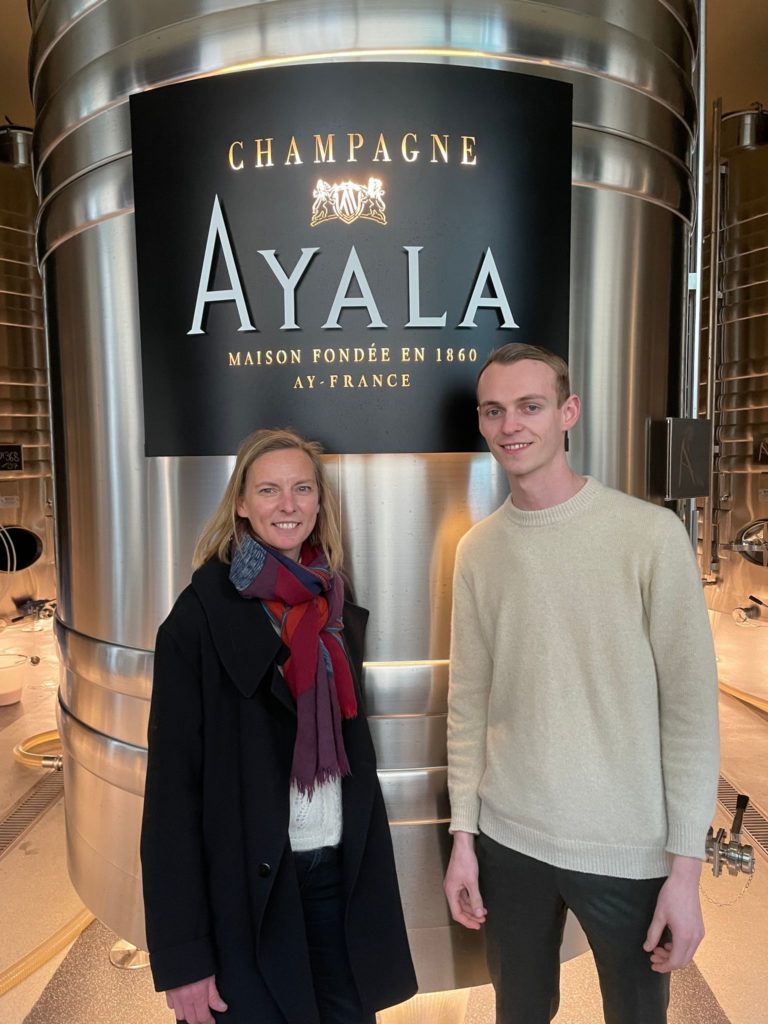
TC: Wow, that sounds like a lot of information to retain. Do you have any idea about which areas the of the wine world the competition will be focused on?
N: “I have only competed in the Nordic competition one time before (placing third in 2022), but it does seem to be more challenging today as the standards are always improving. Say thirty years ago there was not so much consideration for new world wine regions, so just their inclusion in the competition alone equals the necessity for a much broader knowledge base. Today, I even need to know about regions in China for example!

“I’ve always been good at memorising numbers and details and on so. I sort of have to find a way of organising the information for me, whether that’s following a map of a wine region in my mind, breaking it down into sub-regions, or if that seems too complicated I might even do it alphabetically. It all depends. But when that system is in place it becomes a lot easier”
“I could give you the 70 or so appellations of Australia for example. There are six wine producing states, and within each there are a few zones. And within those are regions and some of those regions have sub-regions. For example, I’ll memorize that in South Australia you have eight zones, and in the Barossa zone you have two regions and there is one sub-region as well.”
This is why I spend most of my time on theory, because blind tasting is about combining your taste perception with your theory knowledge in order to give a conclusion that’s logical.
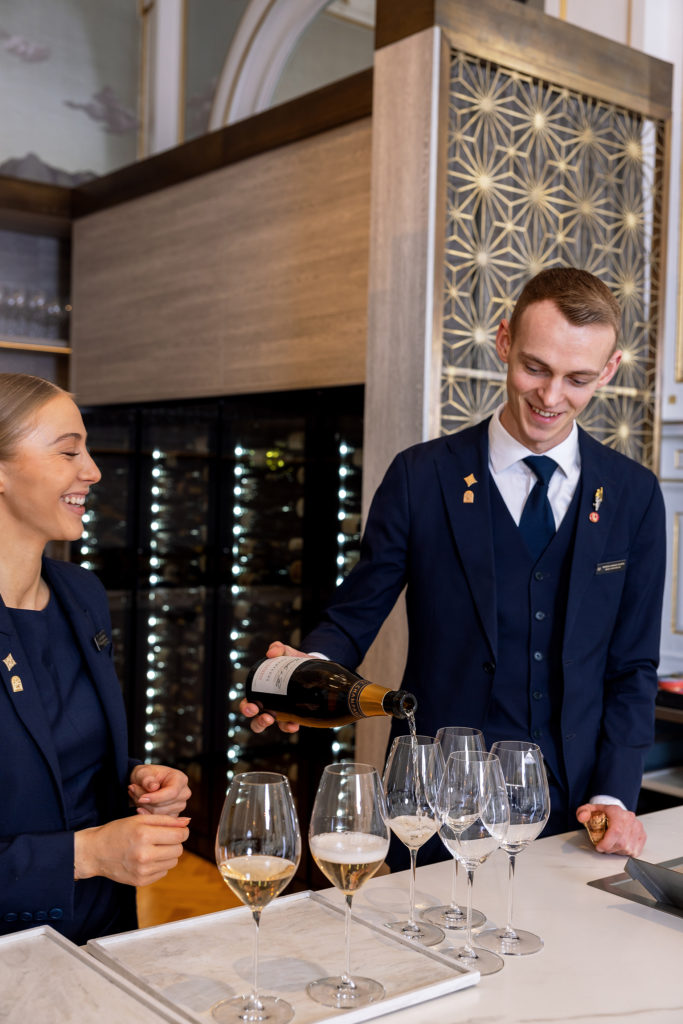
TC: You said blind tasting was just a part of the challenge. Can you tell me more about the other tasks that you are set on the day?
“The awards usually start with a written theory, which can last maybe an hour. Then you have blind tasting, which usually always involve some wine, but often maybe something else as well. Often there will be some sort of spirits or beers too.”

“As the level of the sommeliers increases, the judges have to find new ways to challenge us. So, the competition has become a lot more broad … tasks have even included blind tasting of cheese! In the Nordic competition there is often a slight focus on Nordic drinks and cuisine. So, this year I am starting to plan for Finnish specialities.”
“Then there’s the practical test, which might involve setting up a mock restaurant with tables and guests who are instructed to give the candidates some tasks, maybe decant and serve a certain wine and suggest some food to go with it. You do not get much time to prepare. You enter the room, they give you the tasks and say you have five minutes. There are also tasks where you are given a tasting menu and you have to curate a wine pairing to go with it. You do not know what the task is, but as with any competition it’s about making the judges happy and getting the points.”
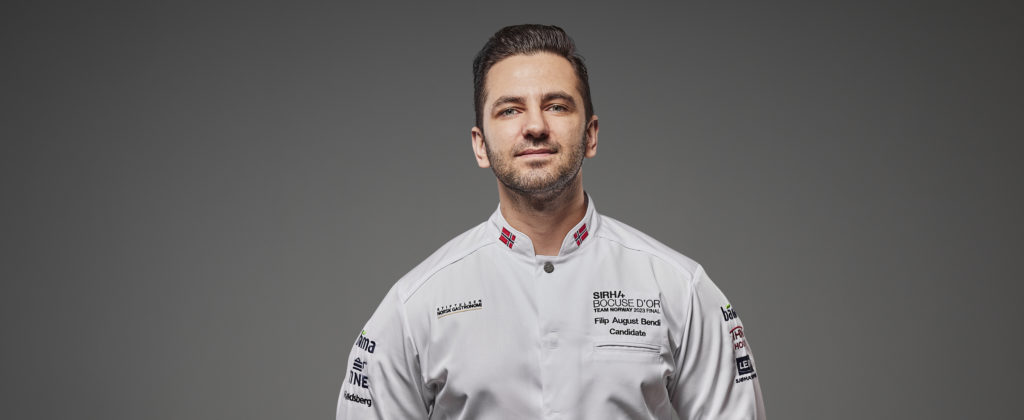
Guest dinner with Filip August Bendi
Palmehavn 13th Oct.TC: It really sounds like there is a mind-boggling amount of information to retain and share. What I’m wondering is how much does the delivery of your answers play in your score? Do the judges take into account the way in which competitors like to carry themselves, how they convey information, speak to guests, speak to the judges?
N: “That has been an issue in that we do not always know exactly what the judges value and do not value. Throughout my competition career, the feedback I have received the most is that I can be very descriptive, but not too entertaining. If someone asks me a technical question I’ll give them a technical answer. Others may be more colourful, but that might compromise your precision, so it’s a balancing act.”
“So, in competition I am much more talkative than I am here, in Speilsalen, where I want to be more discrete. In the competition setting you have to sort of annoy your guests with as many facts as possible. In a nice way of course!”
“If you have five minutes for your main task and you have finished your points, you can still get extra points if you recommend water or suggest a dessert, a cigar, can I get you an avec. It’s a tactic which is sort of opposite to my personality but I do also try to show my style, in terms of my appearance and my wine philosophy and so on.”

TC: And what is your style?
N: My style?
TC: Yes, what do you do differently? There are a lot of expectations about how a sommelier should act, but also a lot of people these days who bring a new type of enthusiasm and approach. I’ve seen you pouring over the maps of the wine appellations of France during your break and of course you always look the part when you are working in Speilsalen! Would you say you are more inclined towards classic wines and classic approach?
N: “If you look within, say a classic wine producing country like France, there are the classic wines and then there are the more avant garde, modern wines. I lean more towards modern wines. I’m not the hippest guy in the room, but I’m definitely not the most classic either!”
“Since taking over as head sommelier in Speilsalen in 2021, I have gradually shifted the wine program towards my style, and I think also my style has developed a lot through the experience of working with a lot of pairings and registering the feedback from guests. I generally lean towards smaller artisanal producers and try to strike a balance between more classic wines and more unconventional styles.“

“What peaks my interest is producers where I sense some sort of passion. Where they are doing something unique in the vineyards, they are putting in more work than the others, pushing boundaries of what their appellation can be.”
“In a lot of wine regions you have a lot of tradition, a lot of people who have inherited a domain, doing the same thing as the guys were doing yesterday. But that maybe doesn’t cut it today. So, within each wine style and region, I want to use the domains which are cutting edge. If I’m going to promote a wine from, say Burgundy, even though there are a lot of great wines there, I have quite a narrow list of names which I want to promote and which truly excite me. I was there this summer in fact and if you look at the variation in approach and overall work ethic in the vineyards, you have a lot of lesser known producers from less celebrated appellations which through their passion and dedication are putting out way better wines than many producers do from the top appellations. And those are the once that I want to champion.”
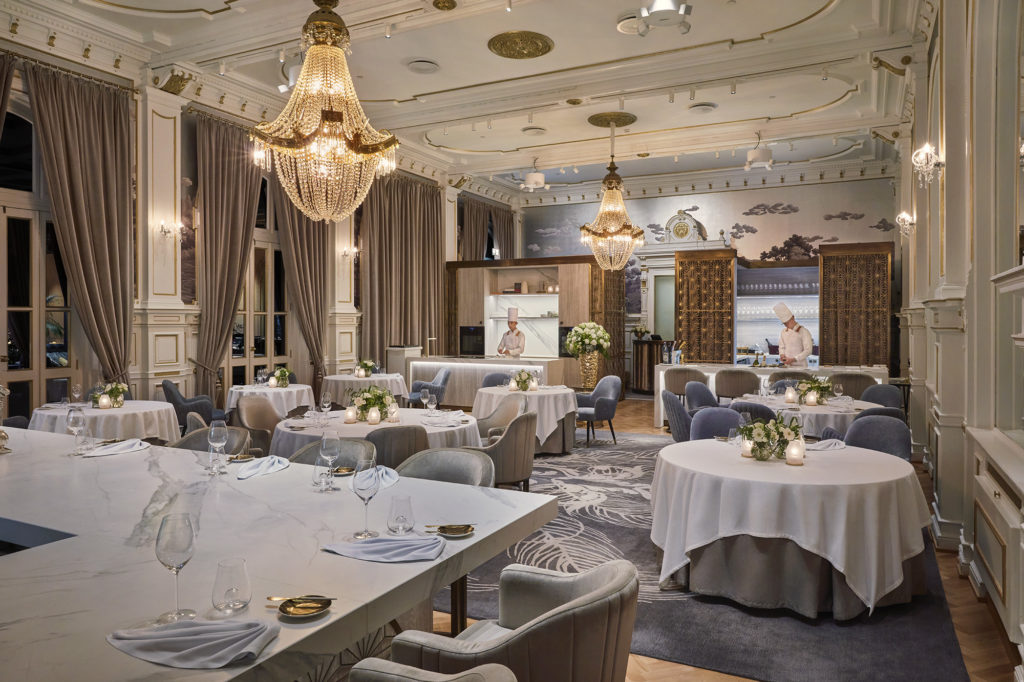
Nordic Sommelier Championships
The Nordic Sommelier Championships occurs once a year, rotating through the five member countries: Denmark, Finland, Iceland, Norway and Sweden. Last year it was in Denmark and in 2023 it is be hosted in Helsinki, Finland.
There are 10 competitors: the top two from each country's respective national competition.
Nikolai's competition history
Junior Wine Award 2019 - 2nd place
Junior Wine Award 2020 - 1st place
Norwegian Sommelier Championship 2021 - 3rd place
Chaîne des Rôtisseurs Jeunes Sommeliers 2021 - 1st place
Norwegian Sommelier Championship 2022 - 2nd place
Nordic Sommelier Championship 2022 - 3rd place
Norwegian Sommelier Championship 2023 - 1st place
Nikolai was interviewed by William Lee-Wright, Creative Editor at Britannia Hotel, and the article was translated from English to Norwegian by Amanda Emily Lorås. All photos by the author unless otherwise specified.